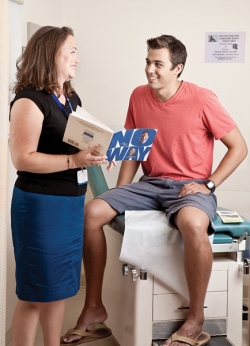Each of the 22 cubicles at the Infusion Therapy Center at the University of Maryland's Greenebaum Cancer Center is filled today, as patient navigator Elizabeth Saylor takes a slow lap around the room.
This is where cancer patients come for chemotherapy. The small spaces include comforts like recliners and televisions, along with seats for guests, but there is no way to evade the deep unpleasantness of the task at hand.
Saylor stops at one berth where Steve Oliver,* a stocky twentysomething with a light beard, reclines, shivering under a blanket while his father eats a Subway sandwich.
"I guess it really is an infection," says Saylor. He nods. Infections are common while patients undergo chemotherapy, since the treatment undermines the body's immune system. Through chattering teeth, Oliver offers a weak smile as Saylor continues her rounds. Later, he'll be diagnosed with pneumonia and admitted to the hospital.
Saylor passes a dozen cubicles with older patients and stops again when she comes to Joe Dobbs,* a rail-thin, bald 28-year-old with advanced skin cancer. His shoes are neatly stacked by the window and his dark eyes contrast sharply with his pale skin.
"How's it going?" Saylor asks warmly.
"It's going," he says, offering a weary smirk. "Do you have a few minutes to talk later?"
Dobbs, it turns out, is wrestling with a major decision. After years of trying to stanch persistent skin cancer with chemotherapy, hope for recovery has faded. He's considering stopping the treatments that leave him ill and weak, to try to enjoy the time he has left.
"I'm going to die anyway," he tells her.
Elizabeth Saylor, MSW, is program director for the Ulman Cancer Fund's Young Adult Patient Navigation Program at the Greenebaum Center. She spends her days helping people between 18 and 40 navigate the many issues and uncertainties that come with cancer, including those specific to young adults.
"There's no good time to have cancer, but I think you could make a strong argument that young adulthood is the worst time" says Saylor, who survived cancer as a child. Children, she explains, have parents to take care of them. Older adults often have grown children. But young adults are often just starting to be independent, to discover themselves.
"You've been a strong, driven person up to the age of 25, then you're hit with this, and it totally shifts how you think about yourself," she says. "It's an existential challenge."
As a sophomore at Brown University back in 1996, Doug Ulman faced just that challenge. It led him to create the Ulman Cancer Fund, the first group in the U.S. specifically designed to support young adults with cancer.
"When you get cancer, it's a shock, and that's even more pronounced when you're in the prime of your life," says Ulman. "It's the last thing on your mind."
Ulman, who grew up in Howard County, was 19 and a member of the soccer team when he started having trouble breathing. Doctors found a cancerous tumor attached to his ribs and removed part of his rib cage.
"It was a very difficult experience even though I had amazing friends and family around me," says Ulman. "I could just imagine how hard it would be for others."
Ulman struggled with his new reality and sought out patients like himself.
"We looked into support groups, and it was mostly older people," he says. "The hospital had groups for kids and their families. I thought, 'There's got to be other young adults but no ones talking to those people.'"
Ulman made a full recovery from the surgery and endured two bouts of skin cancer, but returned to school and even rejoined the soccer team. With the help of his family and childhood friend Brock Yetso, he founded the Ulman Cancer Fund out of his dorm room.
As soon as they launched the group, people started coming forward in droves. "Even people we had known, people we never knew had cancer, came forward," Ulman says.
Ulman graduated in 1999 and began working on the fund full-time, creating social outlets for young adults with cancer and raising funds to support them.
Fellow survivor Lance Armstrong heard about the group and asked Ulman and Yetso to visit his Livestrong Foundation in Austin, TX, which they did in 2000. A year later, Armstrong asked Ulman to join Livestrong as director of survivorship. He has since become president and CEO of Livestrong, while Yetso has taken over as director of the Ulman Fund.
After it completes a current round of hiring, the fund will have 11 employees, including four patient navigators like Saylor (including new ones at The Johns Hopkins Hospital, Greater Baltimore Medical Center, and Georgetown Lombardi Comprehensive Cancer Care), and others advising patients and running the fund from a central office.
Among the many issues unique to young adults, fertility is one of the biggest.
"If you're diagnosed with cancer, doctors usually want you to start treatment right away," says Yetso, noting that oncologists are used to treating older adults. "They don't even think about fertility issues."
Saylor has worked to alter the protocol at Greenebaum, which sees 200 to 300 new young-adult cancer patients a year, so that doctors know to discuss fertility issues with young adults before beginning treatment. If necessary, the fund will pay for patients to bank their sperm or help women find ways to harvest their eggs or ovarian tissue.
Insurance is another big issue. The Ulman Fund, which interacts with as many as 5,000 patients a year through it's navigators, website, and phone consultations, advises patients and refers them to resources that can help them work with insurance companies. They also have an "A-Team" of financial planners and lawyers who work with patients pro bono to battle insurance companies.
Ulman can also help find scholarship money, help with transportation or other expenses, and help new patients navigate issues with employment, housing, and finances.
"Most young adults have never had to advocate for themselves," says Saylor. "Their biggest crisis was, like, 'Who should be my roommate in college?'"
Of course, the most difficult part of the Ulman Fund's work is helping patients confront the possibility of an untimely death.
"I lose about one patient every month," Saylor says. She also works with a lot of young moms and, as a mother herself, she initially wondered if she'd be able to handle that.
"It's gotten easier," she says. "I think I'm actually pretty good at it because I'm a mom." She helps mothers with terminal cancer make videos and write letters for their children to open at graduation or when they turn 16.
"I've found that very rewarding," says Saylor. "It's a very healing process."
A room full of people, including several dozen women wearing neon-yellow race shirts, sit around munching bar food at Union Jack's in Columbia, as Jessica Protasio tells her story. The event is a pre-race luncheon for "Team Fight," a group of about 100 women who have volunteered to compete in the next day's Iron Girl Triathlon to raise money for the Ulman Cancer Fund.
In a halting but chipper tone, frequently interrupted by tears, Protasio explains that, in her 20s, both of her parents died within a year of each other. Soon thereafter, she discovered that she herself had cancer in her liver.
"I was totally alone," she recalls, noting that, while she was based in Howard County, her surviving family was on the West Coast.
Protasio found the Ulman Fund, which helped to fly her family to Baltimore. Saylor took on Protasio's case, aiding her with insurance and employment issues and becoming a tireless advocate, even as Protasio's condition deteriorated to end-stage liver disease.
Protasio endured a failed surgery to remove the cancerous part of her liver ("too much cancer," she says) and three aborted transplants, including one in which Protasio was actually anesthetized for the surgery, only to wake up and find that the transplant hadn't taken place due to a last-minute problem. Saylor was also there when Protasio finally had a successful transplant.
"She waited for me after every oncology appointment," Protasio recalls. "I wasn't alone. You guys really did change my life." At the end of her speech, Protasio holds up her own "Team Fight" shirt and announces that she'll be competing in the race next year.
There isn't a dry eye in the house.
Since recovering, Protasio has become a relentless advocate for the Ulman Cancer Fund, speaking at events like this, which now account for about half of the group's revenue, while also getting cancer survivors and their family and friends involved in the process.
"It's a new strategy for us," says Yetso. "We used to go after big, corporate donors."
Instead, the fund now focuses on grassroots events, many fundraisers, but some just social, where survivors can meet people in similar circumstances. Besides "Team Fight," Ulman also sponsors a training program for survivors called Cancer to 5K, a cycling event called 24 Hours of Booty, and frequent meet-ups at bars under their YACS (Young Adult Cancer Support) program.
"We're always trying to find things that appeal to this age group," says Yetso. "If I go to a breast cancer support group, I'm sitting around with a lot of women my mom's age. I'd never go to a support group, but I'd go to a bar, or volunteer, or train for a 5K."
One problem for young adults with cancer is that doctors aren't as familiar with treating them as they are with others. Survival rates for kids and older adults have increased in recent years, but the rates for young adults are steady. It's partially because there haven't been many studies into the cancer that affect young adults and also because doctors simply don't expect young people to have cancer.
"Most doctors treating young adults, cancer is the furthest thing from their mind," says Ulman. "The doctor says, 'Maybe it's mono, maybe you have the flu.' By the time you get the diagnosis, it could be three or four months after your original symptoms, and survival rates are lower the later you start treatment."
Partially as a result of groups like the Ulman Cancer Fund, Ulman says, big groups like the National Cancer Institute are putting resources into studies on young adults, and survival rates are expected to increase.
"When we started no one was really doing anything for this population," says Ulman. "That's changing now."










